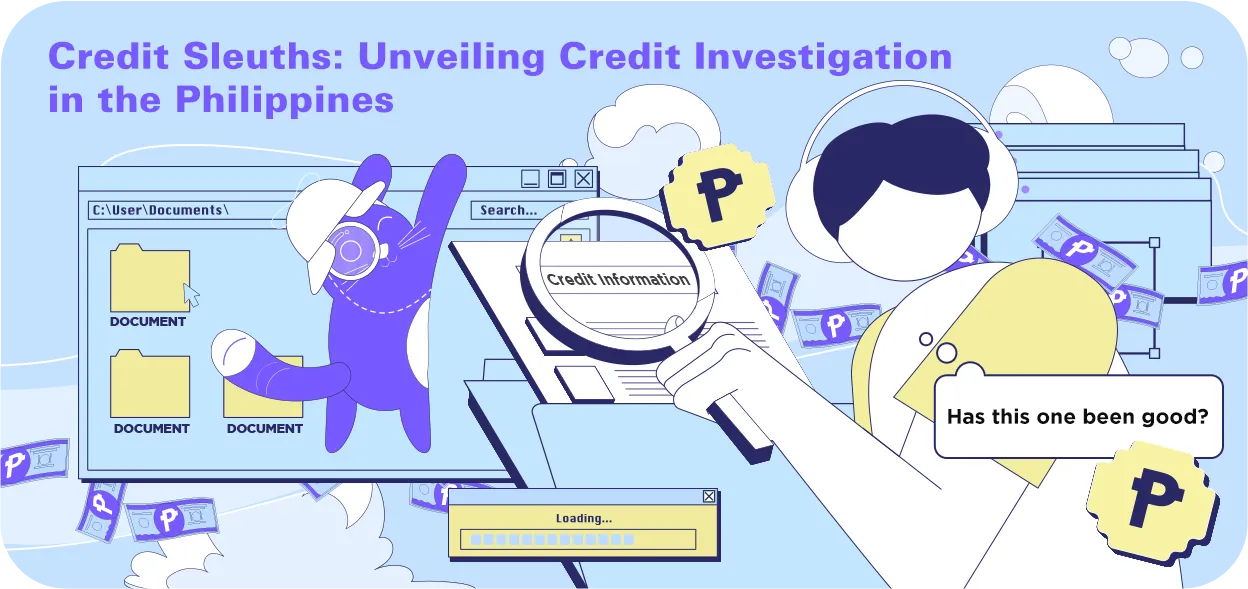Ever wondered how banks and lenders decide if you're eligible for that loan or credit card? They don't just do it randomly, luv. It involves a meticulous process that begins with a credit investigation.
Understanding this process holds the key to unlocking financial opportunities and improving your chances of getting approved for that loan or credit card. So settle down and read up. Let's talk about credit investigation in the Philippines!
Table of Contents
- What is Credit Investigation?
- How Credit Investigation Works
- Key Players in Credit Investigations
- Legal Framework Governing Credit Investigations
- Importance of Credit Investigation for Lenders
- Importance of Credit Investigation for Borrowers
- How to Pass Credit Investigation
- Usual Credit Investigation Questions
- Start Building Credit with Tonik Loans Today!

What is Credit Investigation?
Credit investigation (or CI) in the Philippines – or anywhere, really – is no small thing, luv. It involves a comprehensive evaluation of an individual's or a company's creditworthiness. Think of the investigators as financial detectives combing through your financial history, behavior, and trustworthiness in handling credit and debt.
This assessment helps lenders (both traditional and online lenders) evaluate risk and understand your capability to handle future credit responsibilities. That's why this step is crucial in deciding whether to approve your loan application or extend credit facilities.
TOCHow Credit Investigation Works
To give you a better understanding of credit investigation in the Philippines, here’s the step-by-step of the process!
Step 1: Initiation of Credit Investigation
Credit investigation kicks off when a lender or financial institution receives your loan or credit card application. It's the starting point where they dive into assessing your financial background.
Step 2: Data Collection
Data collection can take the form of various methods.
- Personal Interviews - Sometimes, investigators may conduct face-to-face or remote interviews to gather additional insights into your financial situation.
- Reference Checks - Investigating your references, such as employers or previous lenders, to verify information and assess your reliability.
- Public Records Examination - Reviewing publicly available records to understand any legal or financial matters that may impact your creditworthiness.
- Credit History Review - Delving into your credit history, examining repayment patterns, outstanding debts, and credit utilization.
Step 3: Analysis of Collected Data
The collected information undergoes meticulous scrutiny, aiming to gauge your financial behavior and credit management skills.
Step 4: Credit Investigation Report Preparation
The findings are compiled into a comprehensive credit investigation report, presenting a detailed assessment of your creditworthiness.
Step 5: Delivery of Findings to the Requesting Party
Finally, the lender or requesting party receives the credit investigation report, which influences their decision on your loan or credit application.
TOCKey Players in Credit Investigations

Now we’re really pulling back the curtain. Get to know the key players in credit investigation in the Philippines!
- Banks and Financial Institutions - These entities conduct credit investigations when you apply for loans or credit cards. They're responsible for initiating and overseeing the investigation process to assess your creditworthiness.
- Credit Bureaus and Credit Reporting Agencies - Credit bureaus play a significant role by compiling and maintaining your credit history. They provide reports to lenders upon request, offering insights into your credit behavior and financial reliability.
- Private Investigation Firms - Some financial institutions may outsource credit investigation tasks to private investigation firms. These firms specialize in gathering and analyzing financial data to assist in determining an applicant's creditworthiness.
- Government Regulatory Bodies - Government regulatory bodies set the guidelines and regulations for credit investigations. Organizations like the Bangko Sentral ng Pilipinas (BSP) in the Philippines oversee and regulate these processes to ensure fairness and compliance with standards.
Legal Framework Governing Credit Investigations
To ensure fair practices in credit investigation in the Philippines, there’s a legal framework in place. Here's an overview of key legislations and regulatory bodies shaping the landscape of credit investigations
- Republic Act No. 9510 - Credit Information System Act (CISA) - This act established the Credit Information Corporation (CIC), promoting the efficient exchange of credit information among lenders and contributing to sound credit decisions.
- Data Privacy Act of 2012 - Enforced by the National Privacy Commission, this law safeguards personal information, ensuring its proper handling and protection during credit investigations.
- Role of the Securities and Exchange Commission (SEC) - The SEC contributes to the oversight of credit reporting agencies and ensures their compliance with relevant laws and regulations.
- Bangko Sentral ng Pilipinas (BSP) Regulations - The BSP, as the central bank, issues regulations that govern the conduct of credit investigations, fostering transparency and fairness in lending practices.
Importance of Credit Investigation for Lenders
We’ve briefly touched on this already, but let’s take a deeper dive so you can understand why credit investigation in the Philippines is a must for lenders!
- Risk Assessment and Management - Credit investigations serve as a fundamental tool for lenders in assessing and managing risks associated with extending credit. It helps them evaluate an applicant's creditworthiness, allowing them to determine the probability of repayment and potential risks involved.
- Informed Decision-Making in Credit Approval - By scrutinizing an individual's credit history and financial behavior, lenders can make informed decisions regarding credit approvals. This informed approach enables them to offer suitable credit terms and loan amounts aligned with the borrower's repayment capacity.
- Prevention of Fraud and Financial Losses - Thorough credit investigations aid in detecting discrepancies or fraudulent activities in loan applications. By verifying information provided by applicants, lenders can mitigate the risk of fraud, thereby preventing financial losses.
- Portfolio Quality Maintenance - Maintaining a high-quality loan portfolio is essential for lenders. Credit investigations contribute to maintaining portfolio quality by ensuring that loans are granted to individuals or businesses with a demonstrated ability to repay, reducing the likelihood of defaults.
Importance of Credit Investigation for Borrowers
News flash: credit investigation doesn’t just benefit lenders – it can do wonders for good borrowers as well! Here’s why:
- Access to Credit Opportunities - Credit investigations open doors to various credit opportunities, influencing the ability of borrowers to secure loans and credit lines.
- Interest Rate Determination - These investigations directly impact the interest rates offered to borrowers, affecting the overall cost of borrowing money.
- Terms and Conditions of Loans - The terms and conditions of loans, including repayment schedules and loan amounts, are often influenced by the outcomes of credit investigations.
- Financial Reputation and Creditworthiness - The credit investigation outcomes contribute to shaping a borrower's financial reputation and creditworthiness, impacting future borrowing capabilities.
How to Pass Credit Investigation
If you’re worrying about credit investigations, don’t. It’s easy to pass credit investigation in the Philippines as long as you follow these 5 helpful tips!
- Maintain a Good Credit History - Timely payments, avoiding loan defaults, and responsible credit use are key. A clean credit history positively influences investigations.
- Regularly Check Your Credit Report - Ensure accuracy to rectify any errors that could impact your creditworthiness. A clean report is crucial during investigations.
- Limit Credit Applications - Numerous inquiries within a short period might be a sign of financial distress. Limit applications to maintain a positive credit image.
- Maintain Stable Employment – Consistent employment history demonstrates financial stability, showcasing your capacity for loan repayments.
- Provide Accurate Information - Ensure all details in loan applications are accurate. Misleading information can lead to rejection or delays in the investigation process.
Usual Credit Investigation Questions
Still worried even after all those tips? Here are the usual questions that are asked during credit investigation in the Philippines! Read below and make sure you’re prepared for your interview.
- Personal Information - Full name, date of birth, residential address, and contact details.
- Employment Details - Employment history, current job position, employer's name, and contact information.
- Financial Information - Income details, sources of income, existing debts, and monthly expenses.
- Credit History - Details about past loans, credit cards, repayment history, and any outstanding debts.
- Asset Information - Details about owned properties, vehicles, investments, or other assets.
- Purpose of Loan/Credit - Reason for the credit application, such as for a home purchase, education, or business.
- Additional Information - Any other relevant information or supporting documentation related to the credit application.
Note that these are only a few of the questions that you might get asked during credit investigation in the Philippines. Make sure you’re confident and well-prepared before your interview!
TOCStart Building Credit with Tonik Loans Today!
Understanding the ins and outs of credit investigation in the Philippines empowers Filipinos to present themselves favorably to lenders and credit institutions.
By maintaining a good credit history, being transparent and accurate with information, and staying proactive in managing finances, borrowers can enhance their creditworthiness.
Remember, credit investigations are not just about approval or denial; they are about building and maintaining a strong financial reputation.
Now, do you feel more confident about credit investigation in the Philippines? If the answer is yes, then it’s time to start building bank credit with Tonik Loans. Download the Tonik App and apply today!







